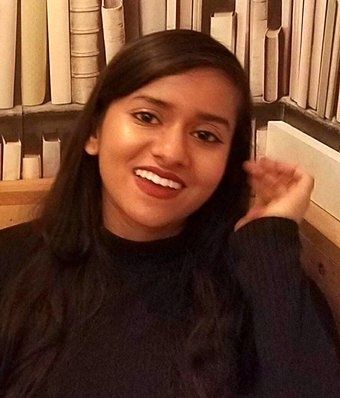Columbia College | Columbia University in the City of New York
In the Core, She Stumbled Into Something She Loved

After finishing her B.A. in English, Bansinath pursued an M.F.A. at the School of the Arts, where she concentrated in fiction; she occasionally cross-registered at the Journalism School. She is a 2019 recipient of the Felipe P. De Alba Fellowship for fiction writing. Bansinath is represented by the Wylie Agency and is at work on her first novel — she finally finished a rough draft.
What were you like when you arrived at Columbia?
I remember romanticizing what my time at college would be like. I thought I would wear black boots and be very studious and glamorous. In reality, I was always floating somewhere between excitement, nervousness and extreme imposter syndrome. I remember not attending the surf and turf during Orientation week out of pure anxiety. Instead, I ate granola bars in my dorm — I’ll never forgive myself for passing up lobster. I was pretty reclusive, and would bring tote bags into the dining hall to pack away an obscene amount of fruit.
I also came in a little brash: I thought I would take a slew of credits, work an internship, pack my weekend doing “cultured city” things and somehow remain mentally afloat. I was in the Ballroom Dance Club for a little bit; the team magically somehow practiced past midnight, and I eventually dropped off. I didn’t have the grit for those late nights.
Those first few months at the College I stretched myself really thin, before learning what kind of workload I could realistically handle. In general, I thought I was super grown up. I really had no idea how young I was or how much I didn’t know.
What do you remember about your first-year living situation?
I lived in a tiny single on the fourth floor of Furnald, and I loved it. I had heard Furnald was a quieter dorm where residents kept to themselves, and that was a big draw. My floor was really nice; in hindsight I wish I’d been more of a participant in the activities they planned, especially ones involving food. Oh, and I locked myself out so many times — I remember locking myself out one night when I went to the bathroom, in sleep shorts and socks. I didn’t have my contacts in or my glasses on me, and wasn’t aware you could ask the front desk for help in those kinds of underdressed scenarios. So, I walked outside in socks, past Butler, and all the way to Hartley for a spare key. It was mortifying. I’m glad my vision was blurry and that I couldn’t see anyone’s reaction.
What Core class or experience do you most remember, and why?
University Writing was probably one of the most impactful Core classes for me. I think I came to the College with a little bit too much writing confidence (I was swiftly humbled). My UW teacher was in the M.F.A. program; she was an exceptional essay writer who freelanced for different magazines. I had never dabbled in essayistic nonfiction writing or journalism before that class. Nothing came easy, and that was a good thing: She challenged us on a line-by-line basis and encouraged us to pitch our op-eds and pieces. Nothing came of mine, but working with her inspired me, and without realizing it I stumbled into something I loved. Then, second semester freshman year, I wrote an essay for a New York Times college competition and got honorable mention, which was really cool. I remember sharing that accomplishment with my UW teacher and feeling incentivized to maybe keep writing and publishing pieces.
Did you have a favorite spot on campus, and what did you like about it?
I really loved the Avery Architectural and Fine Arts Library. It was a less-busy alternative to Butler; a quiet, relaxing workspace. I got some dark academia vibes in there, and that was certainly appealing. I also didn’t ever run into anyone I knew — another plus; I have (and had) so much social anxiety. Running into peers and acquaintances fills me with a particular nervousness, so I liked libraries that belonged to other Columbia schools. There was a guarantee of anonymity. There was also a cafe downstairs with bomb fried eggplant sandwiches.
What, if anything, about your College experience would you do over?
So much! I sometimes wish I could redo all of college after my frontal lobe closed: I’d like to think I’d make better personal decisions now than I did then.
I wish I hadn’t been so reclusive and had gotten out of my comfort zone more, both personally and academically. I also wish I hadn’t devoted quite as much time to unpaid and low-paid internships as I did: It’s very easy to pour a lot of your labor and time (and Fridays) into glossy internships. And while those are important and valuable ways to spend your time, I think your labor can be taken advantage of.
There were many times where I’d be at my internships, in the endless deluge of filing, mailing and photocopying, and think, “I could be working on that paper, or doing that reading or participating in that Friday salsa class.” It’s a sunk-cost consideration (this, from my brief stint in [Sunil] Gulati GSAS’86’s “Principles of Economics”), but I wonder how much richer my learning experience would have been if I redirected that photocopying energy into my classes and writing and friends.
More “Take Five”
- 1 of 31
- ›

